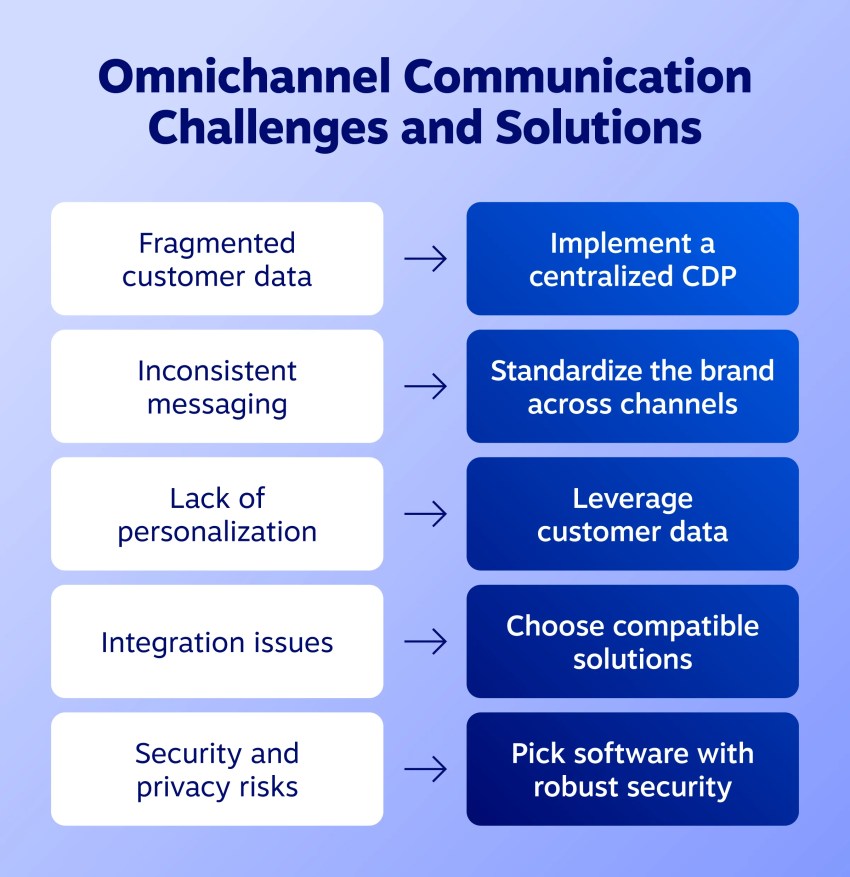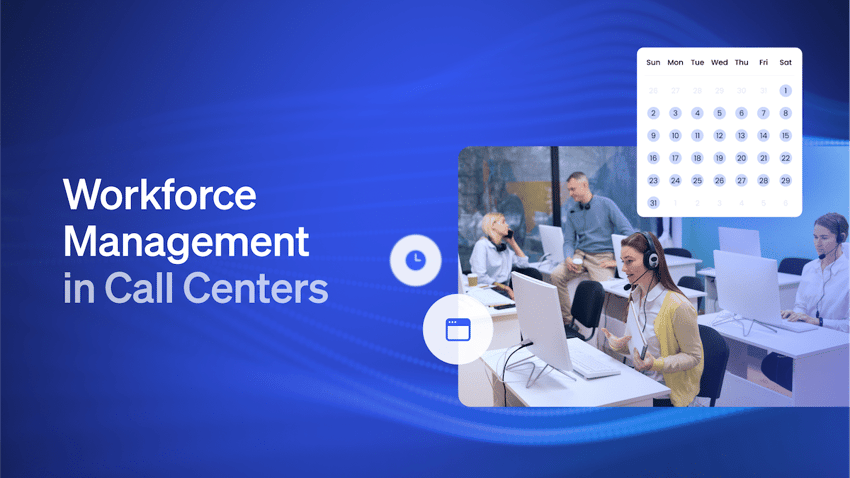When a business offers its customers multiple ways to reach out, like email, chat, and phone, this is considered omnichannel communication. And organizing these communications using an omnichannel communication platform is key. A unified system allows you to provide an efficient and consistent customer experience (CX) that improves satisfaction and increases customer loyalty.
With customer expectations higher than ever, a single poor interaction can have lasting consequences. Recent CX research shows that more than half of customers will switch to a competitor after just one unsatisfactory experience, and 73% will leave after repeated issues. This makes omnichannel communication software critical for delivering consistent, connected experiences across every touchpoint.
In this article, we’ll explore the benefits of omnichannel communication systems, review some of the top platforms, and outline what to look for when choosing a provider that aligns with both customer expectations and business needs.
What is an Omnichannel Communication Platform
An omnichannel communication platform is a unified system that combines your company’s customer communications into one location. Messaging apps, phone systems, and email are all integrated into one platform to provide a seamless customer experience across various channels.
Omnichannel vs. Single-channel communications
A single-channel approach focuses on one mode of communication, like a phone line or a dedicated email address. While this method can be simple to manage, it operates in a silo. Customer interactions on one channel are completely separate from those on another, which can create a disjointed and frustrating experience.
An omnichannel communication strategy connects all channels to create a single, continuous conversation. The customer is placed at the center, and the entire interaction history is accessible to the agent with helpful context, regardless of the channel the customer uses to connect. The goal is to provide a unified brand experience where the customer never has to repeat themselves.
| Feature | Single-channel Communication | Omnichannel Communication |
|---|---|---|
| Channels | Single, isolated channel | Multiple channels integrated and work together |
| Customer view | Fragmented: Each interaction is separate and without context from other channels | Unified: A complete history of customer interactions is visible in one place |
| Experience | Disconnected: Customers must repeat themselves when switching channels | Continuous: Conversations flow from one channel to the next |
| Goal | To address customer requests on a specific channel | To provide consistent and personalized experiences across all touchpoints |
Why You Need Omnichannel Communication
How you communicate with your customers is essential to creating an exceptional customer journey, increasing customer satisfaction, and building customer relationships. Happy customers = more revenue. For this reason, 96% of companies recognize CX as crucial to their business success. With omnichannel communication, your support agents can engage with customers quickly using an organized and automated platform.
CX without omnichannel communication
Disconnected experiences can often result in frustrated customers. Consider this common scenario where a customer emails with several product questions and, after not receiving a reply for hours, calls the support line. The customer service agent, with no access to the previous email, must ask the customer to explain everything again.
This disjointed process leads to multiple transfers, with the customer having to re-explain their problem each time. This not only wastes the customer’s time but also creates a negative impression of the brand and increases agent workload.
CX with omnichannel communication
With an omnichannel communication system in place, that same scenario unfolds differently. When the customer emails their question, they automatically receive a ticket number and a resolution timeframe. When they follow up with a phone call, the agent can instantly pull up the customer’s ticket, see the issue, and confirm that a specialist is already on the case.
The agent can provide a quick update, confirming the conversation from the email and setting the right expectation for a resolution, all without making the customer repeat their story. This integrated approach saves time, reduces friction, provides an exceptional customer experience, and boosts confidence in your brand.
| Embracing Omnichannel Communication: A Real Life Scenario |
|---|
| The global automotive manufacturer, Hyundai, struggled with a fragmented customer service system. Customers couldn’t access the information they needed or get help in a timely fashion. After partnering with Nextiva to unify their disparate business listings and social media pages, Hyundai saw a 98% improvement in response time and an 11% increase in positive customer service reviews. With custom analytics, automation, and real-time message alerts provided by the Nextiva platform, Hyundai expressed that they could “seamlessly and efficiently respond to customers and improve our brand image.” |

7 Best Omnichannel Communication Platforms
There are countless omnichannel communication systems. Below are our picks for the top omnichannel communication platforms.
| Platform | Starting price | Key features | Best for | Rating |
|---|---|---|---|---|
| Nextiva | $15/month | An all-in-one AI-powered platform with automation, customization, and real-time insights | Any-sized business | 4.8 |
| Freshdesk | $35/month | Knowledge baseReal-time analyticsCustomer portal | Phone support | 2.8 |
| HubSpot | $0/month | Live chatMultiple ticket pipelinesStart with free tools | Free tools | 2.0 |
| Intercom | $39/month | Customizable messengerNo-code workflowsPay per AI resolution | Larger teams | 3.2 |
| Zendesk | $25/month | Automatically generate ticketsCustomize your portalSupport 40+ languages | App integration | 1.8 |
| Zoho desk | $9/month | Create custom escalation rulesManage customer contact info | Low-cost options | 4.1 |
| LiveAgent | $19/month | Advanced ticketing featuresNo setup costs | Free trial | 4.2 |
- Nextiva
- Freshdesk
- HubSpot
- Intercom
- Zoho
- Zendesk
- LiveAgent
1. Nextiva
Best for any business size
Trustpilot score: 4.8 / 5

Nextiva is an AI-powered omnichannel communication solution with more than 1 million users. For small businesses, Nextiva offers three plans ranging in price from $15/month to $75/month. However, they also provide custom solutions for larger enterprises with monthly, usage-based, and concurrent pricing options.
Nextiva’s AI helps automate routine tasks and provide personalized support with tailored interactions. These tasks include routing, querying the knowledge base, transcription, translation, building reports, and more. There’s even a chatbot that uses machine learning to personalize messages conversations with your customers.
Nextiva claims that up to 90% of customer interactions can be automated using their AI. Considering how much time this can save you, the return on investment (ROI) is undeniable, regardless of your business size.
Starting price
You can get started with a free personalized demo of the Nextiva platform. After that, subscriptions start at $15/month when billed annually. Here’s a quick breakdown of your options:
- Core: $15/month paid annually
- Engage: $25/month paid annually
- Power CX: $75/month
Nextiva also offers enterprise-level services starting at $75/month per agent.
Key features
- Automate your workflows and communication tracking.
- View real-time stats on customer interactions.
- Route calls with simplified IVR.
- Conduct unlimited video calls.
- Use the built-in database to store customer contact info.
- Get help from AI with all tasks, from call routing to summarizing customer interactions.
 Pros
Pros
Phone support included
AI-powered automation
24/7 customer support from Nextiva
 Cons
Cons
No free trial period
2. Freshdesk
Best for phone support
Trustpilot score: 2.8 / 5

Freshdesk Omni is the customer service suite offered by Freshworks. This platform offers omnichannel communication features with AI support across three packages, costing $35/month to $131/month.
Each of their subscriptions includes limited AI features and a customer portal, while Freshcaller is required for inbound and outbound voice support. Its knowledge base allows customers to function independently while still having access to human agents through phone calls. The Freshdesk Omni platform also features numerous app integrations.
However, two of these key features come with an added price. Freshcaller, with its extensive phone support features like call recording and IVR phone trees, starts at $15/month (billed annually). And Freshdesk’s AI assistant, Freddy AI, is $29/month (billed annually) for your staff to use.
Starting price
Freshdesk Omni offers a 14-day free trial, allowing you to explore the tools before you commit. After that, you have three packages to choose from:
- Growth: $35/month or $29/month billed annually
- Pro: $83/month or $69/month billed annually
- Enterprise: $131/month or $109/month billed annually
Key features
- Gain access to a knowledge base and customer portal with all paid packages.
- Provide phone support with the optional Freshcaller.
- Customize your dashboard with real-time analytics.
- Integrate with common chat apps like WhatsApp, Facebook Messenger, and Instagram.
- Purchase optional day passes.
 Pros
Pros
14-day free trial
Fully customizable with API
Customer knowledge base provided with all packages
 Cons
Cons
AI services cost extra
Freshcaller costs extra
Advanced ticketing features are restricted to the higher-priced packages
3. HubSpot
Best for a wide variety of free tools
Trustpilot score: 2.0 / 5

HubSpot offers an omnichannel CX solution with its Service Hub. Business owners can start with a robust set of free tools or upgrade to a paid subscription, which costs from $15 to $100 a month.
Service Hub’s packages include live chat plus access to HubSpot’s other services, like the Marketing Hub and Sales Hub. Standout features of the paid subscriptions include ticket automation, conversation routing, and SLAs.
While the HubSpot platform is easy to set up and use, this comes at the cost of customization. You’ll need to purchase their most expensive package if you want custom integrations, reporting, or workflows.
Starting price
HubSpot offers a free version of its customer service software; however, it has significant limitations, like a maximum of three email templates, one ticket pipeline, and HubSpot branding. Beyond the free version, there are three Service Hub packages:
- Starter: $15/month or $9/month billed annually
- Starter Customer Platform: $15/month or $9/month billed annually
- Professional: $100/month or $90/month billed annually
HubSpot also offers an enterprise-level package of Service Hub starting at $150/month.
Key features
- Chat with customers live.
- Organize tickets by region, brand, etc., with ticket pipelines.
- Create and save up to 5000 email templates.
- Add a product library with up to 15 million products.
- Customers can schedule meetings with you.
 Pros
Pros
Start with Service Hub for free
Free access to other helpful business tools
Create custom workflows
 Cons
Cons
No free knowledge base or customer portal
Custom features are restricted to the highest-tier subscription
Minutes are limited
4. Intercom
Best for large teams
Trustpilot score: 3.2 / 5

Intercom’s CX suite comes in three different subscription packages, ranging from $39 to $139 a month. All of these subscriptions include a Fin AI agent that can automatically resolve customer queries.
While Intercom offers valuable tools suitable for businesses of all sizes, its upgraded packages are ideal for larger teams. Features like custom workflow automation for ticket handling, round-robin assignments, and complimentary lite seats help provide a quick and seamless experience for your customers and staff.
Regarding Intercom’s AI, you can pay per resolution for Fin AI queries. This allows you to experiment with the AI without committing to a separate monthly fee. However, if your customers frequently use Fin AI, the $0.99 fee per resolution could significantly increase your bill.
Starting price
All of Intercom’s monthly subscriptions come with a 14-day free trial, and you get a discount for paying annually. Here’s a quick breakdown:
- Essential: $39/month or $29/month billed annually
- Advanced: $99/month or $85/month billed annually
- Expert: $139/month or $132/month billed annually
- AI Agent only: $0.99/resolution with 50 resolutions minimum
In addition to the monthly fee, all packages required a $0.99 fee per completed AI resolution.
Key features
- Chat live using a fully customizable messenger.
- Integrate with 50+ apps like Stripe, Facebook, and Jira.
- Automate tasks with no-code workflows.
 Pros
Pros
14-day free trial
Integrates with most common apps
Only pay for the AI you use
 Cons
Cons
Per resolution costs can snowball quickly
Expensive platform for small businesses
5. Zendesk
Best for app integration
Trustpilot score: 1.8 / 5

Zendesk offers four subscription plans for its AI-powered customer service platform, ranging in price from $25/month to $219/month. Base features include ticket automation, full-featured dashboards, and custom reports. Higher-tier plans offer features such as AI assistance, live chat, a knowledge base, and numerous customizations.
But where Zendesk really excels is with its app integration. This platform offers over 1,000 integrations with popular apps like Shopify, Slack, and Microsoft Teams.
Zendesk also offers custom-built packages, but each add-on has its own fee. Want extra AI automated resolutions? It will cost you $1.50 each. Need more minutes, SMS support, or additional data storage? All these features will cost you. There’s even an upcharge for Zendesk support.
Starting price
Zendesk offers four different pricing plans for its CX software.
- Support Team: $25/month or $19/month billed annually
- Suite Team: $69/ month or $55/month billed annually
- Suite Professional: $149/month or $115/month billed annually
- Suite Enterprise: $219/month or $169/month billed annually
Key features
- Tickets are automatically generated when a customer contacts you.
- Offer support in 40+ languages.
- Customize your portal theme.
- Route conversations by availability, ticket priority, and agent skill level.
 Pros
Pros
1,000+ apps and integrations
Customize layouts, workflows, and more
 Cons
Cons
Lots of sneaky add-ons
Limited Zendesk support
High prices
6. Zoho
Best for low-cost options
Trustpilot score: 4.1 / 5

Zoho offers several business tools, including Zoho Desk for omnichannel communication support. With four subscription packages ranging in cost from $9/month to $50/month, this omnichannel messaging platform is very affordable.
With their base package, you get access to multi-channel support, custom workflows, and contact management tools. With higher-priced subscriptions, you’ll get tools like instant messaging, a knowledge base, phone integration, and an AI assistant.
Unfortunately, many of these advanced features only come with the top-tier plans.
Starting price
Zoho Desk also offers a 15-day free trial for all of its subscription packages. The pricing on the four packages starts at:
- Express: $9/month or $7/month billed annually
- Standard: $20/month or $14/month billed annually
- Professional: $35/month or $23/month billed annually
- Enterprise: $50/month or $40/month billed annually
Key features
- Create custom workflows and ticket escalation rules.
- Manage your customer contact details.
- Organize tickets with a round-robin assignment.
 Pros
Pros
15-day free trial
Affordable pricing
CRM support
 Cons
Cons
Limited AI
Phone line not offered
7. LiveAgent
Best for free trial
Trustpilot score: 4.2 / 5

LiveAgent is an omnichannel communication tool that advertises 130-plus ticketing features. It offers four subscription packages starting at $19/month, which are designed for businesses of different sizes.
The hallmark of LiveAgent’s services is the free trial. Most of their packages come with a 30-day free trial. Plus, there is no setup fee or contract, and you can cancel your services at any time. But while the free trial is a great feature, the software has some significant disadvantages.
The biggest drawback is the add-on services that can significantly increase your monthly billing. Social media integrations cost an extra $39/month each, time tracking costs an extra fee for the lower-level packages, and the base package lacks crucial CX features like analytics, call center, and customization.
Starting price
LiveAgent offers an unprecedented 30-day free trial on all of its subscription packages except for Enterprise. While the company sometimes offers limited-time discounts, the standard pricing is:
- Small: $19/month or $15/month billed annually
- Medium: $35/month or $29/month billed annually
- Large: $59/month or $49/month billed annually
- Enterprise: $85/month or $69/month billed annually
Key features
- Find and organize your tickets with advanced filters and custom tags.
- Monitor visitors in real-time.
- Create custom roles for staff.
 Pros
Pros
Online customer forum
Advanced ticketing features
30-day free trial
 Cons
Cons
Lots of add-on pricing
No analytics in the base package
Features To Look for in Omnichannel Communication Software
When comparing one omnichannel messaging platform to another, there are a few key features to consider. You can use these features to gain valuable insights, meet customer needs, optimize resource allocation, and enhance customer satisfaction.
- Unified inbox or agent workspace: A unified system ensures that all communications are easily accessible in one place, which is arguably the most important feature for omnichannel communication.
- AI and automation: Many platforms offer AI to some degree, from generative responses and simple automation to full-fledged AI agents/assistants.
- Customer journey tracking: various analytics can help you track and manage the customer experience from start to finish.
- CRM integration: You likely already have a system for managing your customer contact details. With CRM integration, this info is readily available on your omnichannel platform.
- Advanced reporting and analytics: With custom-built reports and analytics, you can track key metrics like first response time, customer satisfaction, etc., and quickly view the status of all outstanding tickets.
- Channel integration: The whole point of omnichannel software is to communicate with your customers via multiple communication channels. So you’ll want to find a platform that supports the channels you use.
How To Choose the Right Omnichannel Communication Platform
Choosing the best omnichannel software for your business requires careful evaluation. Here are some of the top issues to consider:
- Fits business needs: You’ll need to carefully balance cost and capabilities to find the perfect fit for your business.
- Features and capabilities: Is there a specific feature you absolutely need? Make sure the platform you choose offers it.
- Integration: If you are using specific messaging channels and apps, try to find an omnichannel platform that integrates with your existing systems and your customers’ preferred channels.
- Scalability: To avoid the hassle of switching services later, choose a platform that can grow with you.
- Budget and ROI: Finding a solution that’s within your budget is great, but the right platform needs to give you a solid return on your investment as well.
- Security and compliance: Omnichannel management software will have access to your sensitive customer data. So you’ll want to make sure the platform provides robust security to protect this data and help you stay compliant with worldwide regulations.
The Value in Choosing the Right Platform
California-based Cedar Financial was struggling with an outdated set of customer service systems. They were paying seven different vendors for CX services and faced increasing costs and compliance issues as they grew their business.
By partnering with Nextiva’s AI-powered platform, Cedar Financial increased call volume by a staggering 471% without sacrificing quality or empathy in its customer interactions. This allowed them to simultaneously increase operational efficiency by 40% while also seeing a 30% growth in agent-driven revenue.
With the full-featured Nextiva platform, Cedar Financial could also drop its previous vendors, saving them 30% instantly. Plus, as Cedar Financial grows, Nextiva’s omnichannel communication services will scale with them.
Omnichannel Communication Trends to Watch
As with all technologies, omnichannel communication is constantly evolving, leading to new CX developments such as:
- AI-powered personalization: By pulling data from your CX platform, AI can personalize customer communication and increase customer engagement.
- Unified customer data platforms (CDPs): Customer data from all your apps and systems is consolidated into one central location. This info is then used to create unified customer profiles.
- Voice and conversational AI: Instead of sounding like a computer, this AI uses natural spoken language and machine learning to communicate with customers in a more human way. Plus, these interactions occur in real-time.
- Mobile-first approach: Connecting with customers on their mobile devices ensures a seamless omnichannel customer experience and a better way of engaging customers across all communication channels.
- Data privacy and transparency: Supporting multiple channels comes with increased cybersecurity risks. New features are constantly released to combat these risks, protect sensitive data, and adhere to new privacy regulations.
Unify Your Communications With Nextiva
Did you know that customers expect businesses to reply to them within one hour on average? If you are trying to manage multiple channels without a unified system, a single email, call, or message could easily slip through the cracks. But with an omnichannel communication platform like Nextiva, you can always stay on top of customer interactions.
Nextiva organizes your customer communications in one central location, and the platform empowers you to provide superior CX. With AI and automation, customers feel understood, and staff can resolve issues quickly. Nextiva can be custom-fit to any business, regardless of size or industry. Request your free personalized demo today.
Omnichannel Communication Platform FAQs
Both omnichannel and multichannel systems let you communicate with customers across multiple platforms. However, omnichannel support software connects all these channels into one easy-to-use system for a seamless omnichannel experience.
The best omnichannel communications platform provides a consistent CX, is flexible enough to grow with your business, is affordable, and meets your ROI expectations.
Visibility, measurement, personalization, and optimization are the four elements required for an effective omnichannel communication strategy.

















 Customer Experience
Customer Experience 












